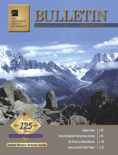
GEOLOGICAL SOCIETY OF AMERICA BULLETIN
Scope & Guideline
Uncovering Geological Truths, One Bulletin at a Time
Introduction
Aims and Scopes
- Tectonics and Structural Geology:
Research in this area includes studies on fault mechanics, tectonic evolution, and the structural characteristics of various geological formations, providing insights into the forces shaping the Earth's crust. - Geochronology and Radiometric Dating:
The journal publishes articles that utilize various dating methods, such as U-Pb zircon geochronology, to establish the age of geological formations and events, thereby contributing to the understanding of Earth's history. - Petrology and Geochemistry:
Papers in this scope focus on the origin, composition, and evolution of rocks, including igneous, sedimentary, and metamorphic processes, often employing advanced analytical techniques to elucidate mineral compositions. - Paleoenvironmental and Paleoclimatic Studies:
This includes research that reconstructs past environments and climate conditions through sedimentological, geochemical, and paleontological evidence, helping to understand long-term Earth system changes. - Volcanology and Igneous Processes:
The journal features studies on volcanic activity, magma formation, and related phenomena, exploring the dynamics of volcanic systems and their impact on the environment. - Sedimentology and Stratigraphy:
Research on sedimentary processes, basin evolution, and stratigraphic frameworks is central to the journal, providing insights into depositional environments and geological history. - Geohazards and Environmental Geology:
This area covers studies on natural hazards like earthquakes, landslides, and volcanic eruptions, as well as the geological factors influencing environmental issues.
Trending and Emerging
- Climate Change and Geosciences:
There is a growing emphasis on studies that examine the geological impacts of climate change, including sedimentary responses to climatic shifts, paleoclimatic reconstructions, and the interactions between geological processes and climate dynamics. - Geodynamics and Plate Tectonics:
Research focusing on the dynamics of tectonic plates, including subduction processes, continental collision, and their effects on geological features, has gained prominence, reflecting advancements in geophysical modeling and observational techniques. - Geochemical Cycling and Environmental Impact:
Emerging research addresses the geochemical processes related to environmental issues, such as pollution and resource extraction, highlighting the role of geology in understanding and mitigating environmental impacts. - Integrated Geoscience Approaches:
There is a trend towards interdisciplinary studies that combine geology with other scientific fields, such as biology, chemistry, and physics, to provide comprehensive insights into complex geological problems. - Natural Hazards and Risk Assessment:
Research on natural hazards, including earthquakes, landslides, and volcanic eruptions, has increased, focusing on risk assessment and mitigation strategies, reflecting the growing societal need for understanding geological hazards.
Declining or Waning
- Sedimentary Petrology:
Although sedimentology remains a core area, specific studies focused solely on sedimentary petrology have decreased, possibly due to a shift toward more integrated approaches that combine sedimentology with geochemistry and stratigraphy. - Paleoecology and Biostratigraphy:
Research specifically targeting paleoecological reconstructions and biostratigraphic correlations has seen a decline, as the field evolves towards interdisciplinary studies that incorporate broader geochemical and geophysical data. - Mineralogy:
While mineralogical studies are still relevant, the number of papers focusing exclusively on mineralogical characteristics without broader geological context has diminished, reflecting a trend towards integrating mineralogy with petrology and geochemistry. - Historical Geology:
Research focused on historical geology, particularly studies that do not incorporate modern analytical techniques or interdisciplinary approaches, appears to be waning, as the field moves towards more dynamic and integrative geological research.
Similar Journals

GEOLOGICA ACTA
Connecting scholars, shaping geological innovation.GEOLOGICA ACTA is a distinguished open-access journal dedicated to the field of geology, published by Universitat de Barcelona since its inception in 2003. With an impact factor that reflects its relevance in the academic community and a commendable Q2 ranking within the Earth and Planetary Sciences category, this journal is committed to disseminating high-quality research that spans various aspects of geological sciences. The journal's broad scope encompasses both theoretical and applied research, making it a vital platform for researchers, professionals, and students alike to share their findings with a global audience. With its Open Access policy, GEOLOGICA ACTA ensures that all published articles are freely accessible, fostering collaboration and innovation in the geological community. Based in Barcelona, Spain, at the Geociences Barcelona (CSIC), it plays a pivotal role in connecting scholars from diverse backgrounds and advancing the field of geology through rigorous peer-reviewed articles.
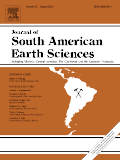
JOURNAL OF SOUTH AMERICAN EARTH SCIENCES
Advancing Knowledge in Earth-Surface ProcessesJOURNAL OF SOUTH AMERICAN EARTH SCIENCES is a premier interdisciplinary journal dedicated to publishing high-quality research in the fields of Earth-Surface Processes, Geology, and Paleontology, making it an essential resource for scientists and researchers focused on South American geology and its diverse geological phenomena. Published by Pergamon-Elsevier Science Ltd in the United Kingdom, this journal has been instrumental in disseminating groundbreaking studies since 1988, showcasing contributions that push the boundaries of knowledge in Earth and Planetary Sciences. With an impressive Scopus ranking—positioning it in the 74th percentile for Paleontology and 71st for Geology—this journal not only reflects robust academic quality but also its commitment to addressing critical geological challenges in South America. Researchers will appreciate its objective of advancing understanding of geological processes while providing insights into past, present, and future Earth environments. Although available through traditional subscription models, the journal's vast repository of articles enriches the academic landscape, facilitating the sharing of vital research among professionals, students, and geological practitioners.
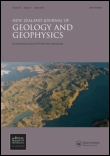
NEW ZEALAND JOURNAL OF GEOLOGY AND GEOPHYSICS
Exploring Earth's Mysteries, One Insight at a Time.NEW ZEALAND JOURNAL OF GEOLOGY AND GEOPHYSICS, published by Taylor & Francis Ltd, stands as a prominent forum dedicated to the interdisciplinary exploration of geological and geophysical phenomena. With an impact factor that situates this journal in the prestigious Q1 category across key subjects—namely Earth and Planetary Sciences, Geology, and Geophysics—it is a critical resource for researchers, professionals, and students alike. The journal has been operational since 1958 and continues to contribute valuable insights into the complexities of the Earth's processes. Although it does not currently offer Open Access options, its broad readership benefits from an extensive archive of high-quality research findings that span from 1958 to 2024. Located in the United Kingdom, the journal remains a pivotal player in advancing the understanding of Earth's systems, making significant contributions to both academic inquiry and practical applications in the field.
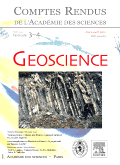
COMPTES RENDUS GEOSCIENCE
Exploring the Depths of Earth Sciences.COMPTES RENDUS GEOSCIENCE, an esteemed open-access journal published by ACAD SCIENCES since 2020, serves as a vital platform for disseminating significant research in the field of Earth and Planetary Sciences. With an ISSN of 1631-0713 and E-ISSN of 1778-7025, this French journal is located at 23 Quai de Conti, Paris, 75006, France. Focusing on various sub-disciplines, it is recognized in the 2023 category quartiles as Q2 in Earth and Planetary Sciences (miscellaneous) and Q3 in Global and Planetary Change. The journal ranks #82 out of 195 in Earth and Planetary Sciences and #79 out of 120 in Environmental Science, reflecting its commitment to quality scholarship and impactful research. The journal's open-access model enhances accessibility, ensuring that researchers, professionals, and students alike can freely engage with cutting-edge findings that contribute to a deeper understanding of our planet and its systems. The ongoing convergence of knowledge from 2002 to 2024 positions COMPTES RENDUS GEOSCIENCE as a crucial resource in the evolving landscape of geosciences.

Journal of Geosciences
Navigating the Frontiers of Earth's ScienceJournal of Geosciences is a distinguished peer-reviewed journal published by CESKA GEOLOGICKA SPOLECNOST, based in the Czech Republic, that serves as a vital platform for the dissemination of innovative research in the field of Earth and Planetary Sciences. With an ISSN of 1802-6222 and E-ISSN of 1803-1943, this journal has established its significance within the academic community, evidenced by its Q3 ranking in both Earth and Planetary Sciences and Geology. The journal covers a broad array of topics, making it an essential resource for researchers, professionals, and students interested in geoscientific advancements and discoveries. The Journal of Geosciences reflects a commitment to high-quality scholarship, embracing a variety of methodologies and interdisciplinary approaches, and provides open access to its content, thereby encouraging global collaboration and knowledge sharing among geoscientists. With a publication history converging from 2007 to 2024, it continues to be a prominent venue for critical conversations and developments in the ever-evolving field of geosciences.

Journal of the Geological Society of Korea
Pioneering Discoveries in the Geological CommunityJournal of the Geological Society of Korea, published by the Geological Society of Korea, is a pivotal platform for researchers and professionals in the field of geology and earth sciences. With an ISSN of 0435-4036 and an E-ISSN of 2288-7377, this journal fosters the dissemination of scholarly articles that encompass a wide range of topics within earth and planetary sciences. Despite being categorized as Q3 in both Earth and Planetary Sciences (miscellaneous) and Geology, the journal has made significant strides in contributing to academic discourse, with a Scopus rank indicating robust participation in its academic field. Located in Seoul, South Korea, the journal aims to provide a comprehensive resource for the geological community, inviting submissions from both Korean and international researchers alike. With the convergence of years from 2019 to 2024, the Journal of the Geological Society of Korea stands as a vital resource for advancing our understanding of geological phenomena and fostering collaboration within the global geosciences community.

Journal of Earth Science
Innovating research for a changing planet.Journal of Earth Science, published by the China University of Geosciences, Wuhan, is a leading journal in the field of Earth and Planetary Sciences, recognized for its significant contributions to the understanding of geological processes and environmental challenges. With an impressive Q1 ranking among Earth and Planetary Sciences journals and a strong position at Rank #39/195 in Scopus, this journal not only showcases high-quality research but also serves as a crucial platform for disseminating innovative findings, spanning a broad spectrum of topics from geophysics to climate change. The journal adopts an open access model, which enhances the visibility and accessibility of research articles published from 2009 to 2024, thereby facilitating collaboration and knowledge sharing among the global scientific community. With its commitment to advancing geosciences, Journal of Earth Science is invaluable for researchers, professionals, and students alike, eager to stay informed and contribute to ongoing discussions in this dynamic field.
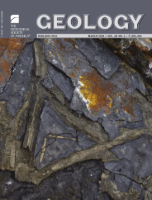
GEOLOGY
Advancing Earth Sciences Through Innovative ResearchGEOLOGY, published by the Geological Society of America, Inc, is a premier journal dedicated to advancing knowledge, research, and discussion in the field of geology. With an ISSN of 0091-7613 and an E-ISSN of 1943-2682, this journal stands out with an impressive Q1 ranking in Geology for 2023, positioning it among the top journals in the realm of Earth and Planetary Sciences, specifically holding a remarkable rank of 11 out of 321, reflecting its 96th percentile status. This journal aims to publish innovative research articles that cover all aspects of geology, from tectonics and sedimentology to paleontology and mineralogy, offering invaluable insights for researchers, professionals, and students alike. Although not currently open access, GEOLOGY maintains a rigorous review process ensuring the quality and integrity of the research it publishes. For more than five decades, spanning from its inception in 1973 to the upcoming publications in 2024, GEOLOGY has been instrumental in shaping the geological discourse and continues to be a vital resource for the scientific community.
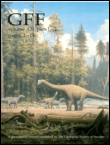
GFF
Pioneering Knowledge in Earth and Planetary Sciences.GFF is a prestigious academic journal dedicated to advancing research in the fields of Geology and Paleontology. Published by Taylor & Francis Ltd in the United Kingdom, GFF serves as a vital platform for disseminating innovative findings and fostering discussions among researchers, professionals, and students alike. With a noteworthy impact factor reflecting its significance in the scientific community, GFF has achieved Q2 ranking in both Geology and Paleontology, underscoring its commitment to high-quality scholarship. The journal has been operational since 1872, accumulating a rich history of contributing to our understanding of earth sciences. It currently ranks #133 out of 321 in Earth and Planetary Sciences - Geology, and #50 out of 113 in Paleontology according to Scopus rankings. Although it does not offer an open access option, GFF remains accessible through various academic databases, ensuring that cutting-edge research reaches a wide audience. Its comprehensive scope aims to explore critical advancements in geological and paleontological sciences, making it an essential resource for those committed to exploring the intricacies of our planet’s past and present.

JOURNAL OF IBERIAN GEOLOGY
Unveiling the intricate layers of Iberian geological phenomena.JOURNAL OF IBERIAN GEOLOGY, published by Springer International Publishing AG, is a pivotal platform dedicated to advancing the field of geology and stratigraphy. With an ISSN of 1698-6180 and E-ISSN of 1886-7995, this journal has earned its reputation in the academic community, holding a commendable Q2 ranking in both Geology and Stratigraphy for 2023, reflecting its contributions to contemporary geological research. Spanning from 2007 to 2024, it provides a comprehensive forum for scholars and practitioners from around the globe to disseminate their findings pertaining to the Iberian Peninsula, enhancing the understanding of regional geological phenomena. The journal has carved out a significant niche within the Earth and Planetary Sciences, ranking #137 out of 321 in Geology and #24 out of 55 in Stratigraphy, indicating its wide-reaching impact and scholarly engagement. The Journal of Iberian Geology serves as an indispensable resource for those interested in the complexities of geological structures, stratigraphic sequences, and the broader implications of geological research, making it a vital reference for researchers, professionals, and students alike.